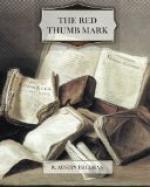A plump, middle-aged man, of keen, though studious, aspect, stepped into the box, and Sir Hector rose once more.
“You are one of the chief assistants in the Finger-print Department, I believe, Mr. Nash?”
“I am.”
“Have you heard the evidence of the last witness?”
“I have.”
“Do you agree with the statements made by that witness?”
“Entirely. I am prepared to swear that the print on the paper found in the safe is that of the left thumb of the prisoner, Reuben Hornby.”
“And you are certain that no mistake is possible?”
“I am certain that no mistake is possible.”
Again Sir Hector glanced significantly at the jury as he resumed his seat, and again Anstey made no sign beyond the entry of a few notes on the margin of his brief.
“Are you calling any more witnesses?” asked the judge, dipping his pen in the ink.
“No, my lord,” replied Sir Hector. “That is our case.”
Upon this Anstey rose and, addressing the judge, said—
“I call witnesses, my lord.”
The judge nodded and made an entry in his notes while Anstey delivered his brief introductory speech—
“My lord and gentlemen of the jury, I shall not occupy the time of the Court with unnecessary appeals at this stage, but shall proceed to take the evidence of my witnesses without delay.”
There was a pause of a minute or more, during which the silence was broken only by the rustle of papers and the squeaking of the judge’s quill pen. Juliet turned a white, scared face to me and said in a hushed whisper—
“This is terrible. That last man’s evidence is perfectly crushing. What can possibly be said in reply? I am in despair; oh! poor Reuben! He is lost, Dr. Jervis! He hasn’t a chance now.”
“Do you believe that he is guilty?” I asked.
“Certainly not!” she replied indignantly. “I am as certain of his innocence as ever.”
“Then,” said I, “if he is innocent, there must be some means of proving his innocence.”
“Yes. I suppose so,” she rejoined in a dejected whisper. “At any rate we shall soon know now.”
At this moment the usher’s voice was heard calling out the name of the first witness for the defence.
“Edmund Horford Rowe!”
A keen-looking, grey-haired man, with a shaven face and close-cut side-whiskers, stepped into the box and was sworn in due form.
“You are a doctor of medicine, I believe,” said Anstey, addressing the witness, “and lecturer on Medical Jurisprudence at the South London Hospital?”
“I am.”
“Have you had occasion to study the properties of blood?”
“Yes. The properties of blood are of great importance from a medico-legal point of view.”
“Can you tell us what happens when a drop of blood—say from a cut finger—falls upon a surface such as the bottom of an iron safe?”




